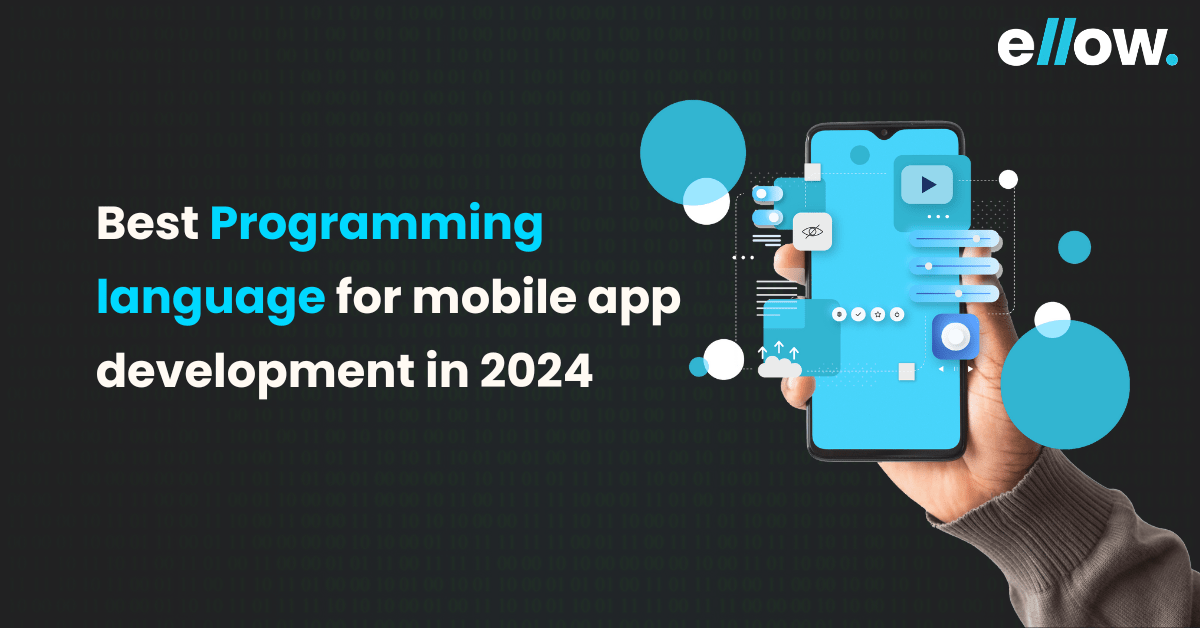Let’s build the future together.
Great ideas need great people. Partner with us to bring your vision to life, or take the first step in your career by joining our team of innovators.

The world is app-hungry! With over 6.4 billion smartphone users globally (Statista, 2023), the demand for skilled app developers is exploding. Firms specializing in mobile app development are witnessing a surge, as businesses of all sizes scramble to find talent to craft their digital experiences.
But amidst this exciting chaos, a crucial question arises: “Which programming language should you choose to build your app dreams?”
Selecting the right language is not just about syntax and frameworks, it impacts your app’s functionality, performance, and ultimately, your career trajectory.
With new programming languages emerging and existing ones evolving, navigating the vast options for mobile app development can feel overwhelming. Fear not, aspiring developer! This article is your guide, exploring the world of app development languages and helping you choose the best one for your project. Whether you’re working with a mobile app development company or building an app on your own, understanding the key languages is crucial for creating powerful, cross-platform mobile applications.
We will explore their strengths, and weaknesses, and how they shape your app’s journey, empowering you to make the perfect choice for your coding adventure.
Choosing the right programming language for your app is like picking the right tool for the job. It impacts everything from how your app works to how smoothly it runs and its success. Here is why selecting the perfect language is crucial:
Just like you wouldn’t use a hammer on a screw, some languages are best suited for specific platforms. For iOS apps, Swift or Objective-C are the go-to choices, while Ruby, JavaScript, or even web development languages might be better for multi-platform apps.
Think of libraries and frameworks as pre-built toolkits. They save you time and effort by providing ready-made solutions for common tasks like database interaction or user interface creation. Choose a language with robust libraries and frameworks that match your app’s needs.
Your app might need to connect with external services, APIs, or other platforms. Make sure the language you choose plays well with others. Check for available APIs, SDKs (software development kits), and a supportive community to help with integrations.
Some languages are known for their speed and control, like C and C++, making them ideal for resource-intensive tasks. But don’t forget about development efficiency. Languages like Python or JavaScript might be faster to develop with but may have some performance trade-offs. Find the right balance for your app’s needs.
Not all languages are created equal. Some excel in specific areas like data analysis (R and MATLAB) or blockchain development (Solidity). If your app deals with a particular domain, consider languages with specialized features and tooling to streamline development.
As your app evolves, you should add new features or functionalities. Choose a language that provides flexibility and customization options. C++ or Java offer features like inheritance and custom annotations, allowing you to create reusable components and even extend the language itself.
Choosing the right type of mobile app is like picking the perfect vehicle for your journey. Each option has its strengths and weaknesses, so understanding them is key. Let us explore the three main types:
Developed by Apple, Swift is the go-to language for iOS app development. Its clean syntax and powerful features make it easy to write and maintain code.
Swift offers safety features like optional and automatic memory management, reducing the chances of runtime errors. Popular apps like Airbnb and LinkedIn use Swift for their iOS versions due to its performance and reliability.
Kotlin has gained popularity for Android app development due to its interoperability with Java and concise syntax. It offers features like null safety and extension functions, enhancing productivity and code safety. Apps like Pinterest and Trello have embraced Kotlin for its modern language features and seamless integration with existing Java codebases.
As a long-standing player in the mobile app development scene, Java remains a robust choice for Android app development. Its platform independence, strong community support, and extensive libraries make it a versatile language. Apps like WhatsApp and Instagram rely on Java for their Android versions due to its stability and scalability.
Dart, paired with Google’s Flutter framework, enables cross-platform app development with native-like performance. Its Just-in-Time compilation allows for fast development cycles, while Ahead-of-Time compilation ensures efficient production builds. Flutter powers apps like Alibaba and Google Ads due to its fast development pace and expressive UI capabilities.
React Native leverages JavaScript to build cross-platform mobile apps with a single codebase. Its component-based architecture and hot reloading feature accelerate development. Popular apps like Facebook and Instagram use React Native for their ability to deliver native-like performance and seamless user experiences a cross platforms.
Xamarin, powered by C#, allows developers to build native Android, iOS, and Windows apps with a shared codebase. Its strong integration with Visual Studio and access to native APIs ensure high performance and platform-specific functionalities. Apps like UPS and Alaska Airlines rely on Xamarin for its code-sharing capabilities and native user experiences.
While Swift has largely replaced Objective-C for iOS development, it remains relevant for maintaining legacy codebases. Objective-C offers dynamic messaging and runtime reflection, allowing for flexible app development. Apps like Airbnb and Uber initially relied on Objective-C before transitioning to Swift.
Python’s simplicity and versatility extend to mobile app development, particularly with frameworks like Kivy and BeeWare. Its readable syntax and extensive libraries facilitate rapid prototyping and development. Apps like Instagram and Dropbox use Python for backend services and automation tasks, showcasing its flexibility beyond mobile development.
Web technologies like HTML and CSS, combined with frameworks like Cordova and PhoneGap, enable the building of hybrid mobile apps. Their familiarity and ease of use make them accessible to web developers. Apps like Untappd and Untitled Goose Game employ HTML/CSS for their cross-platform compatibility and rapid development cycles.
Rust’s focus on safety and performance makes it a compelling choice for mobile app development, especially for resource-intensive applications. Its ownership model and zero-cost abstractions ensure memory safety and prevent data races. While less widely adopted in the mobile space, Rust is gaining traction for apps like Firefox Focus due to its security and efficiency benefits.
Although primarily associated with web development, Ruby can be used for mobile app development with frameworks like RubyMotion. Its elegant syntax and developer-friendly features promote rapid development. Apps like Basecamp and Couchsurfing have utilized Ruby for its productivity gains and expressive codebase.
Prolog’s declarative programming paradigm makes it suitable for certain types of mobile applications, particularly those involving rule-based logic or expert systems.
Its built-in pattern matching and backtracking capabilities simplify complex problem-solving tasks. While not commonly used for mobile development, Prolog finds applications in niche domains like educational apps and decision support systems.
Lisp’s flexibility and metaprogramming capabilities make it a niche choice for mobile app development, particularly in AI and game development. It’s homoiconicity and macro system enable powerful abstractions and domain-specific languages.
Apps like Autodesk SketchBook and WolframAlpha demonstrate Lisp’s potential for innovative and specialized applications.
Malboge, known for its esoteric nature and challenging programming style, is not a practical choice for mainstream mobile app development. Its intentionally obscure syntax and unconventional execution model make it unsuitable for real-world projects.
While it may serve as a curiosity or educational tool, Malboge lacks the practicality and support required for mobile app development.
Go’s simplicity, concurrency support, and fast compilation times make it an appealing option for mobile app development, particularly for backend services and command-line tools. Its built-in garbage collection and static linking simplify deployment and maintenance.
While not as prevalent as other languages in the mobile space, Go is gaining traction for apps like Docker and Kubernetes due to its performance and scalability benefits.
When considering the top programming languages for app development in 2024, it is essential to prioritize versatility, platform compatibility, performance, and security. Python stands out for its adaptability, while JavaScript excels in creating both websites and mobile apps.
Swift remains the go-to choice for iOS app development, while Java remains strong for cross-platform and corporate applications. Rust emerges as a formidable option for its combination of performance and security, while Kotlin gains ground for Android app development over Java.
To make informed decisions in this competitive landscape, it is crucial to align language choices with project requirements, target platforms, and developer proficiency. Leveraging platforms like ellow.io can streamline the process of hiring skilled mobile app developers, ensuring that your projects stay on track and ahead of the curve in this rapidly evolving industry.
Kotlin has emerged as a popular choice for Android app development due to its modern syntax, concise code structure, interoperability with Java, and strong support from Google. Read this blog to learn more about the best programming languages for Android app development.
Swift is the preferred language for iOS app development. It offers safety features, improved performance, and easy integration with Apple’s ecosystem, making it a favorite among iOS developers.
Yes, JavaScript is an excellent choice for mobile app development, especially for creating cross-platform apps using frameworks like React Native and Ionic. It allows developers to write code once and deploy it across multiple platforms, saving time and effort.
Python’s versatility and simplicity make it a compelling option for mobile app development, particularly for prototyping, backend development, and data analysis tasks. While not as common for front-end mobile app development, Python can still be integrated into mobile projects for various purposes.
Java remains a vital programming language for mobile app development, particularly for creating Android apps. It offers robust tools, extensive libraries, and widespread community support, making it an ideal choice for developing scalable and secure Android applications.

GCC vs Outsourcing vs Remote Teams: What Works in 2026

Vibe Coding vs AI Assisted Coding: The Difference That Will Define the Next Generation…

From Code Generation to Bug Detection: 10 AI Tools Every Developer Should Know in…
Please feel free to share your thoughts and we can discuss it over a cup of tea.
Get a quote
GCC vs Outsourcing vs Remote Teams: What Works in 2026

Six Things to Consider When Hiring Remote Talent

ellow.io enters remote hires market with AI-based screening process